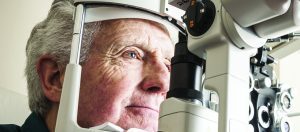A simple eye test may detect the disease before memory loss occurs.
By Dr. Shaminder Bhullar
 Alzheimer’s, the most common form of dementia, affects more than 5 million Americans — and it’s projected to soar to 13 million over the next 35 years.
Alzheimer’s, the most common form of dementia, affects more than 5 million Americans — and it’s projected to soar to 13 million over the next 35 years.
In the face of the growing worldwide Alzheimer’s disease epidemic, there is a pressing need for simple, less invasive diagnostic tests that will identify the risk of Alzheimer’s much earlier in the disease process.
As there is still no known cure for Alzheimer’s disease, many research studies continue to focus on finding new methods for early detection of the disease. Early detection and treatment can help patients with their symptoms and make life more manageable for their loved ones.
A simple eye test can help diagnose Alzheimer’s Disease years before memory problems start.
Four studies recently presented at the Alzheimer’s Association International Conference in Copenhagen, Denmark, strengthen prior evidence that the earliest signs of Alzheimer’s disease may be present in the eyes.
These studies have shown that the same abnormal protein that accumulates in the brains of Alzheimer’s patients also accumulates in the retina; which unlike other structures of the eye, is part of the central nervous system, and therefore shares many characteristics of the brain.
This could mean earlier treatment, and could give people a chance to plan. There is no treatment for the buildup of certain abnormal proteins in the brain associated with Alzheimer’s disease. But there are treatments for some of the symptoms. There are also treatments that can slow the disease’s progress. If an eye exam can shed light on the early diagnosis of Alzheimer’s, as researchers claim, people with Alzheimer’s could begin treatment to slow down the disease years earlier, before any symptoms are seen.
It is also interesting to note that certain treatments available for symptoms of Alzheimer’s disease work best when instituted early in the disease process, however as time goes on they become less effective.
The goal, therefore, is make the diagnosis at an earlier stage, allowing those affected to initiate treatment as soon as possible while treatments are still useful.
Although not everyone may want to know they have an incurable disease, others will want to know, so that they can properly make plans for the future. It will be interesting to see where this research leads us in the diagnosis and treatment of Alzheimer’s disease.
Dr. Shaminder Bhullar is a board certified ophthalmologist and fellowship trained retina specialist. He has authored numerous papers and presented at national meetings. He is a member of the Florida Medical Association, American Medical Association, American Academy of Ophthalmology, and American Society of Retina Specialists.
Dr. Bhullar is proud to be able to offer patients of Manatee and Sarasota County the latest treatment options, state of the art diagnostic technology and the most up to date medical and surgical interventions for diseases of the retina, macula and vitreous. He and his staff at the Retina Treatment Center are passionate about providing patients the highest quality of care, with the compassion and respect they deserve.
For more information, please visit retinatreatmentcenter.com, or call our office at (941) 251-4930.









